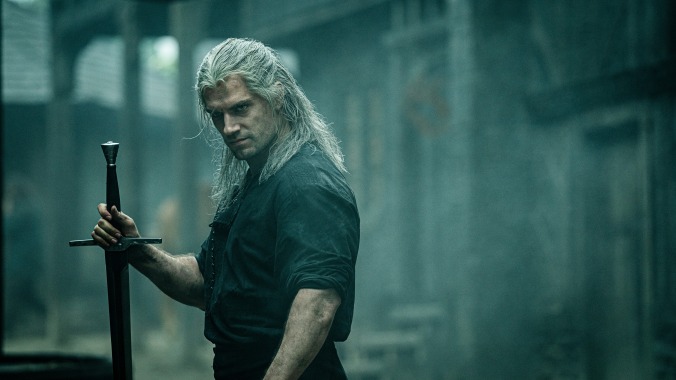Netflix’s The Witcher is a lot more fun once it stops pretending it’s the next Game Of Thrones


TV studios and streamers have been trying to find the next Game Of Thrones since pretty much the moment the HBO blockbuster first took flight. You’d be forgiven, then, for confusing Netflix’s lushly shot new fantasy epic The Witcher (adapted from the bestselling books by Polish author Andrzej Sapkowski, which also inspired the Witcher games developed by CD Projekt Red) for a deliberate knock-off of the more lurid and readily imitable aspects of the HBO juggernaut. At least, at first. The show’s pilot goes heavy on Westeros’ more meme-worthy aspects—swords, blood, gratuitous nudity, all suspended in a thick morass of “serious” moral ambiguity—giving every initial impression of having been taken in fully by this hindbrain-hitting surface illusion of easy genre success. What else are we to make of a series that opens with its monotone antihero of a protagonist—still awash in monster blood from his latest, flashily acrobatic kill—being led into an enchanted garden filled with nubile, nude, unspeaking women, while a pompous wizard mumbles backstory, exposition, and threats? When that same episode ends by intercutting between a brutal massacre, some ugly examples of mob mentality, and a full-on medieval mass suicide montage, the series begins to take on a tone verging on deliberate parody. Do you want Serious Fantasy TV? Rest assured, The Witcher screams, at full volume and directly into your face: This is some Serious Fucking Fantasy TV.
But a closer look reveals this whole opening salvo as mostly bluster; it’s not hard to imagine some Netflix executive scribbling down notes on the show’s pilot, passing them to showrunner Lauren Schmidt Hissrich, and watching anxiously as she evaluated suggestions like “More boobs and throat stabbings, please.” But these growing pains mostly subside after the first, overly grim episode to reveal a far more interesting show—albeit one with its own, more honestly come by flaws. These are mostly imposed by convolutions that sequester the series’ three protagonists—the titular Witcher, Geralt Of Rivia (Henry Cavill); ascendant sorceress Yennefer of Vengerberg (Anya Chalotra); and imperiled princess Ciri (Freya Allan)—into three essentially separate shows. It’s a formula for frustration, gratification delayed so long that it threatens to spoil before ever being served. But when The Witcher actually does manage to get its various characters into close proximity with each other—something it studiously avoids doing for most of its first five episodes, to a degree that feels very nearly perverse—it manages to find some real magic in the chemistry between them, and in the twists it applies to old-fashioned tropes of fairytale magic.
The first of these three shows-within-a-show, the one centered on taciturn monster-slayer-with-a-heart-(and-eyes)-of-gold Geralt, is also the most episodic and straightforward in nature. That owes mostly to its strict adherence to the show’s source material, with each episode adapting one of the stories included in Sapkowski’s anthology The Last Wish, the English-speaking world’s first introduction to Geralt’s reality. That same, directly adapted structure explains why these segments can be so hit-or-miss, with the second episode’s brief sojourn among a cell of fantasy guerrilla fighters proving especially dire. (Cavill strives, but “glumly resigning himself to die until the other guy gives up” isn’t the most exciting posture for a fantasy protagonist to adopt.) When these sections work, though—as they do in the show’s third entry, which sets a baseline by establishing Geralt as much as a curse-busting detective as a sword-swinging slayer of beasts—they’re the show’s most potent source of thrills. For a series that spends so much time on talk, the action choreography is both clear and engaging, and any time Geralt busts out his paired swords is cause for cheering.
As for the man himself, well: Cavill looks great, sounds pretty lousy, and is clearly trying his best. Certainly, his gravel-y monotone is done no favors by being compared to the voice performance of Doug Cockle, the actor who played Geralt to exceptional effect in the three video games that helped popularize the character in the U.S. Nor does he hold up especially well in comparison to Chalotra’s Yen, who gets the show’s most dynamic character arc, going from abused pig farmer to a student at the show’s excessively gritty version of Hogwart’s to a wielder of considerable political power and magical skill. Yennefer’s unsatisfiable proactivity underscores just how dull Geralt’s essentially passive “Constantly protests he’s not a good guy while reluctantly doing good things” nature really is—even if both of them still come off better than the show’s third protagonist, Ciri, who ends up living through a CliffsNotes version of the early life of poor, doomed Arya Stark. Although Allan, like Cavill, does her best with what she’s given, she’s trapped with the show’s weakest material, embarking on a deathbed-imparted quest to “find Geralt of Rivia” that seems to mostly involve not finding Geralt of Rivia. Instead, she stumbles from one innocence-eroding set piece to the next, killing time until the show’s actual plot finally catches up with her.
The young princess is the one hardest done by the show’s oddball format. Occasionally this more holistic perspective pays off, but more often it leaves Ciri’s story limping along from one nihilistic encounter to the next, waiting for Geralt and Yen to get to her so that the “real” show can actually start. There’s something vaguely admirable about ditching out on a more traditional story structure, but it often does a violence to the show’s pacing that outstrips the reach of even a monster’s lethal claws.
Still, though: When that fully baked version of The Witcher shows up, it makes a strong argument for being worth the wait. Given a decent scene partner to work with—Chalotra, especially, but also Joey Batey as Geralt’s glib bard buddy Jaskier—Cavill comes to life, employing his considerable comic chops as a sword-swinging straight man. And while gritty fantasy series tend to keep their more “unrealistic” elements at arm’s length, The Witcher embraces its fairy tale nature, albeit in a bloodier than normal fashion. When prophecies, enchanted knights, and cursed princesses can all be a part of the tricky maneuvering of statecraft, there’s room for a man with a silver sword and a keen eye for manticore anatomy to make an impact in world affairs, and it’s when the show looks closer at the day-to-day realities of being a mutant monster hunter (or a king’s official magical assistant, as the case may be) that The Witcher is at its most interesting. By exploring the intersection between the outright magical and the grimly practical—as all three of its heroes do, to a greater or lesser degree—The Witcher finds rich new ground to explore, whether it’s making light of Geralt’s efforts to market his monster-slaying services, or playing Yen’s political ambitions as deadly serious. (That being said: Do your liver a favor and resist the urge to imbibe every time the word “destiny” gets busted out, lest a single binge-watch brutally knock you dead.)
Here in its earliest run, The Witcher is by no means perfect; even ignoring the earlier structural flaws, its efforts at comedy often come off sounding a bit too modern for the rest of its setting, and the characters’ tendency to monologue to any unspeaking object or person they can find—horses, mute companions, literal dead babies—verges on comedic. But when the worst thing you can say about a series is that every episode ends up being better than the one that preceded it, that leaves an exciting amount of room to grow. Especially when you can see it steadily moving out of the shadow of the show Netflix might have wanted, in favor of the far more interesting series it might actually turn out to be.